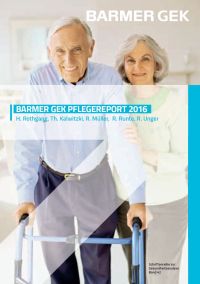
The ninth BARMER GEK Long-Term Care Report was presented to the public today at the Federal Press Conference. The report examines especially the effects of the most recent reforms in long-term care on the provision of care to those in need of it. The team, headed by Professor Heinz Rothgang and including Thomas Kalwitzki, Rolf Müller, Rebecca Runte und Rainer Unger, also scrutinized the regional differences in terms of long-term care requirements and provision structures. The data base for the report is primarily long-term care statistics for around 2.6 m. people in need of care, the German Socio-Economic Panel Study and routine insurance data from BARMER GEK, which covers approx. 10 percent of the population.
Main results of the Report:
- The reform measures taken so far are taking effect. Under the LTC Redirection Act (PNG, 2012) and the First Act to Strengthen Long-term Care (PSG I, 2015), specifically services for people with dementia were improved, and the provision of respite and part-time care was made more flexible. Figures show a marked increase in the utilization of these services in particular. Also dental care in care homes, which was also the subject of various new regulations, has been improved.
- The introduction of the new definition of the need for long-term care under the Second Act to Strengthen Long-term Care (PSG II, taking effect as per 1.1.2017) is a very generous, and hence very expensive, reform. It is calculated that additional expenditure will amount to more than 7 bn. Euros compared to the status quo. An increased contribution rate will generate more revenue from contributions; however, this will not suffice to cover the additional costs, even taking the surplus funds currently generated by care insurance into account. For 2017 a structural deficit of more than 3bn. Euros is anticipated.
- In nursing homes, the increased costs mean financial relief for those in need of long-term care and their families, and also indirectly for welfare agencies; however, nursing home revenues will not increase to the same degree. Thus, the reform does not mean that nursing homes will be better staffed. If we want higher staffing rates, further reforms will be necessary in the coming years.
- Immense differences can be observed from state to state in terms of the increased number of people in need of long-term care but also with regard care arrangements and the capacities within the formal care sector, and the extent of future gaps in the care workforce. It is clear from these discrepancies that long-term care must be conceptualized and planned at a regional or local level.
Downloads (in German only):
BARMER GEK Long-Term Care Report 2016
Statement from Prof. Rothgang at the Press Conference on 24.11.2016
Presentation given by Prof. Rothgang at the Press Conference on 24.11.2016
Contact:
Prof. Dr. Heinz Rothgang
SOCIUM Research Center on Inequality and Social Policy
Mary-Somerville-Straße 3
28359 Bremen
Phone: +49 421 218-58557
E-Mail: rothgang@uni-bremen.de
Dr. rer. pol. Rolf Müller
SOCIUM Research Center on Inequality and Social Policy
Mary-Somerville-Straße 3
28359 Bremen
Phone: +49 421 218-58554
E-Mail: rmint@uni-bremen.de











